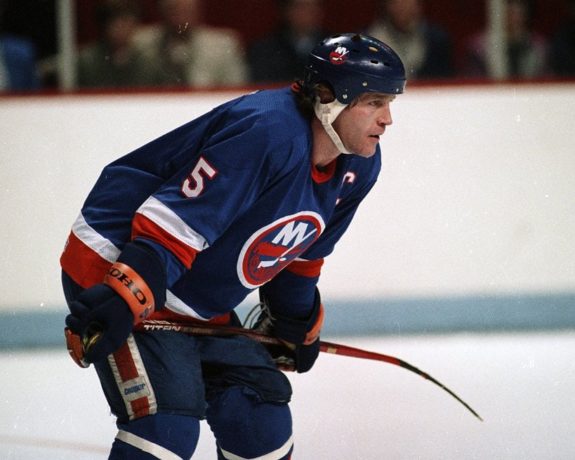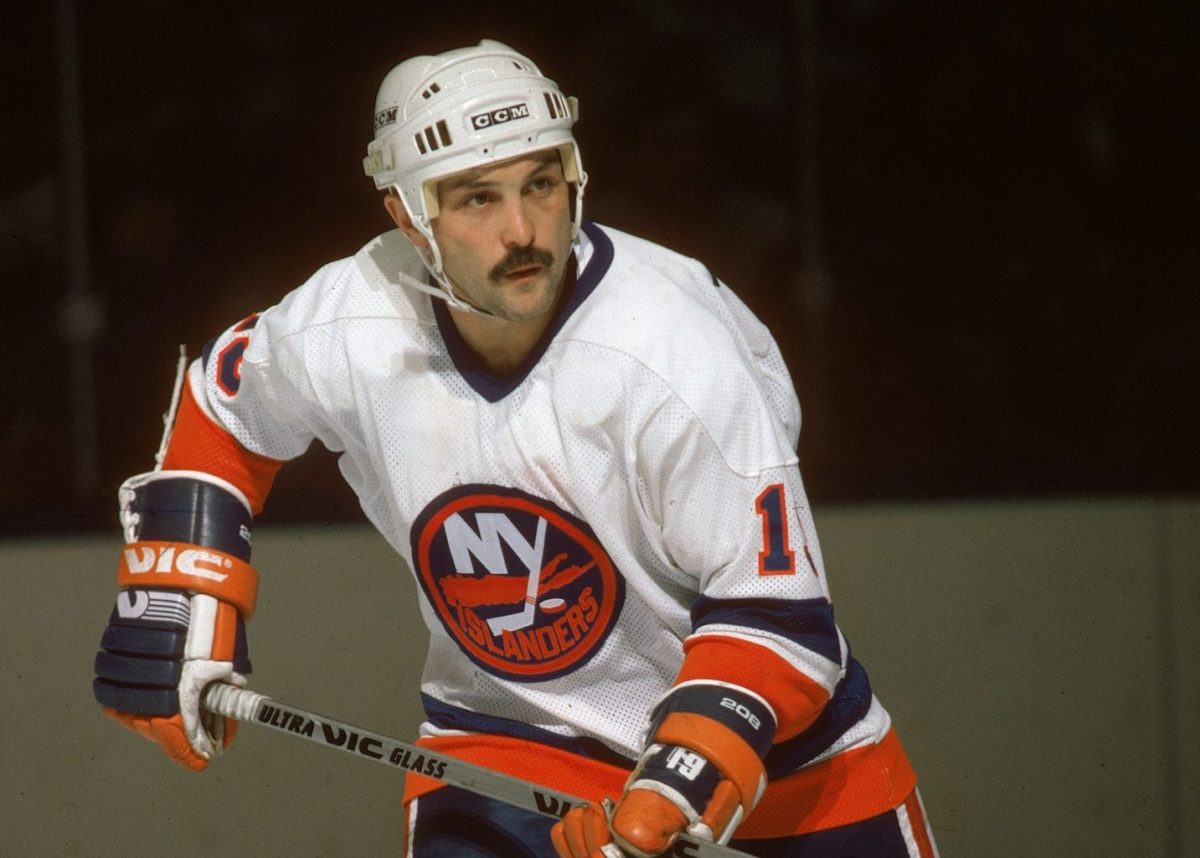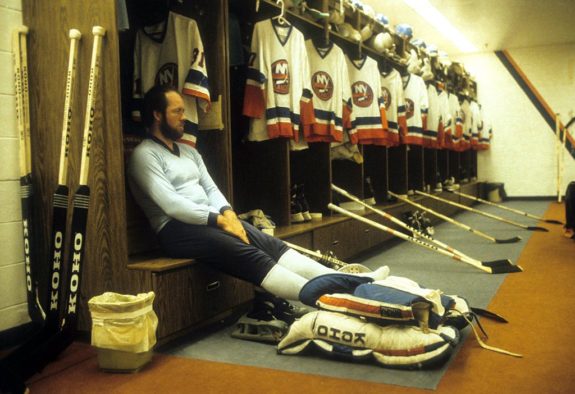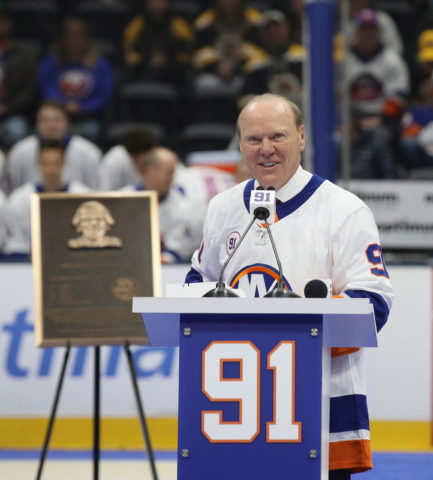The ’12 Days of Christmas’ is a classic holiday song first published in its current form in 1908. In a nod to the classic carol, join The Hockey Writers as we count down the 12 Days of Hockeymas. Each day, we will provide you with a piece of hockey history as we eagerly await the start of the 2020-21 NHL season.
On the 8th day of Christmas, The Hockey Writers gave to me, eight New York Islanders Hall of Famers. The Isles became a historic franchise in the ’80s and, as a result, legends were born. Here’s a trip down memory lane and a look at who those dynasty era players were.
Denis Potvin
Selected to the Hall of Fame in 1991, the Ontario native was drafted first overall by the Islanders in 1973, the year after the birth of the franchise. Considered “the next Bobby Orr,” Denis Potvin was expected to be the savior of the Islanders when he entered the league, despite that the franchise was a year old.
Potvin may not have dominated as Orr had done, but he still burst onto the scene, claiming the Calder Trophy (as the NHL’s top rookie) in the 1973-74 season, and the Norris Trophy (the NHL’s top defenseman) in 1975-76. He claimed top defenseman honors two more times in 1977-78 and 1978-79. It didn’t take long for Potvin to make a name for himself as one of the NHL’s best players.
Potvin became the Islanders’ third captain in their short history in 1979-80 and led the team to their first of four Stanley Cups, a year after they fell to the New York Rangers in the semi-final.

Potvin was the NHL’s first defenseman to score 300 goals and rack up 1,000 assists. He held onto both titles until Paul Coffey, Ray Bourque and others surpassed those milestones.
Clark Gillies
Did you know Clark Gillies signed a minor league baseball deal with the Houston Astros and moved to Covington, Virginia where he played three years of minor league baseball in the Appalachian League? He did so at just 16 years old, platooning as a catcher/first baseman.
Eventually, Gillies found his way to the Western Hockey League, playing for the Regina Pats. After scoring 46 goals and tallying 66 assists for the Pats in 1974, the Islanders selected the Saskatchewan native with their first pick in the 1974 NHL Draft, at fourth overall. He quickly made a name for himself in the NHL, pummeling Philadelphia Flyers enforcer, Dave Schultz, one of the toughest players in the league.
In 1976-77, Gillies was named captain of the Islanders, however, uncomfortable as the team’s leader, he relinquished the “C” to Potvin in the 1979-80 season.
Starting in 1975-76, Gillies scored more than 30 goals in four straight seasons, solidifying himself as one-third of the “Trio-Grande” with Mike Bossy and Bryan Trottier. On Dec. 6, 1997, Gillies’ #9 was retired by the Islanders and five years later, the quad-Cup winner was inducted to the Hall of Fame in 2002.
Bryan Trottier
Bryan Trottier claims that if it wasn’t for his close pal Tiger Williams, he would have stopped playing hockey because he was homesick. Thankfully, “Trots” opted to continue his career, and the Isles selected him in the second round of the 1974 NHL Draft, at 22nd overall.
The following year, Trottier set a rookie record with 95 points, and it was an easy decision to award him with the Calder Trophy. A few years later, he recorded his best season with 134 points, earning both the Art Ross Trophy as the league’s leading scorer, and the Hart as NHL MVP.
As a member of the core dynasty, Trottier earned the Conn Smythe en route to the Islanders’ first Stanley Cup victory and helped them claim three more in consecutive seasons. In 1981-82, he tallied 50 goals, the most in his 18-season career.

In the early ’80s, broadcaster, Stan Fischler and Islanders head coach, Al Arbour, continuously claimed Trottier was the best player in an NHL that included Wayne Gretzky. He was known as an all-around center who had a rugged game and was defensively sound.
Trottier is best known for being part of the dynamic duo with Bossy until Bossy was forced to retire early in 1987. After the 1987-88 season, Trottier saw his skills decline, which led to a decrease in his point totals. The Pittsburgh Penguins signed him in 1990-91 as a veteran presence and to provide leadership to a young team. He spent three seasons in Pittsburgh before retiring at the end of the 1993-94 season.
Mike Bossy
Bossy is still considered by many to be the greatest pure goal-scorer/sniper of all time. Believe it or not, the Quebec native was passed over 12 times in the 1977 NHL Draft, including by the Toronto Maple Leafs and New York Rangers, who passed on him twice.
Selected 15th overall, Bossy was the right selection for general manager Bill Torrey, who was torn between him and Dwight Foster. The one knock against the sniper’s game was that he couldn’t throw a check. However, the 77 goals in his last season in the QMJHL spoke for itself.
The “Trio Grande” was complete when Bossy replaced Billy Harris on the Islanders’ top line with Trottier and Gillies, creating one of the NHL’s best lines. The goals came quick and e often for the team’s newest sniper, and on Feb. 4, 1978, he collected his first hat trick in a 6-1 win over the Washington Capitals.
Twenty-one days later, Bossy recorded his 45th goal of the season, passing Rick Martin’s rookie record of 44. Bossy then told Torrey that he would score 50 goals by season’s end, and finished with 53. That was plenty to name him the Calder Trophy winner for 1978-79, a second-team All-Star, and earn him a place on the Campbell Conference roster for the 1978 NHL All-Star Game.
By Feb. 29, 1979, Bossy recorded his 100th goal in his 129th game, the fastest player to reach that milestone. After helping the Islanders claim four Stanley Cups, in 752 games, Bossy recorded an impressive 573 goals and 553 assists, and in 129 playoff appearances, he tallied 85 goals and 75 assists.
“On January 24, 1981, New York Islanders’ winger Mike Bossy became the second player in NHL history to score 50 goals in the first 50 games of a season. The original feat was accomplished by Maurice “the Rocket” Richard, thirty-six years earlier, in the 1944-1945 season.”
Bossy still holds the NHL record for most consecutive 50+ goal seasons with nine and shares the honor with Gretzky as one of two players to have scored 50 or more goals for nine seasons.
The three-time Lady Byng Memorial Trophy winner was forced to retire following the conclusion of the 1986-87 season due to a number of back injuries after just 10 seasons in the NHL. Bossy was named to the Hall of Fame in 1991, and on March 3, 1992, his number became the second to be retired by the Islanders.
Bobby Nystrom
In 1972, “Mr. Islander” was claimed 33rd overall in the NHL draft. Nystrom spent half a season with the Islanders’ minor league affiliate New Haven Nighthawks of the American Hockey League before he was called up to play with the big boys in March of 1973.
Tallying 41 points in his first full NHL season, Nystrom earned the Calder Trophy for the 1973-74 season, and in each of his first five seasons, the Stockholm native recorded more than 20 goals, including his only 30-goal season in 1977-78.
Nystrom is best known for scoring the game-winner at 7:11 of overtime on an assist from John Tonelli to secure the first Stanley Cup in franchise history. (from ‘1980: Bobby Nystrom’s OT goal gives NY Islanders the Stanley Cup,’ Winston Salem Journal, 05/21/2020) The “Tonelli to Nystrom” line might be the most famous goal call in Islanders history.
He is considered the embodiment of an Islander, and with that, the organization created the Bob Nystrom Award, given to the player “who best exemplifies leadership, hustle, and dedication.” Ironically, the four-time Stanley Cup champion never claimed any league awards.
John Tonelli
John Tonelli had an interesting path to the NHL. He was one of the first players to challenge the Marlies OHA of the OHL, with which he had signed a contract at age 16. After looking to make the leap to the WHA, things got messy, and eventually, Tonelli was awarded the right to play for Houston. After three seasons, he was drafted by the Islanders in the second round (33rd overall) of the 1977 NHL Draft.
As one half of the duo that helped the Islanders claim their first Stanley Cup, Tonelli assisted on the championship-winning goal, and, like Nystrom, he embodied the “never say die” attitude of that dynasty-era team. Dubbed the “Greasy Jet” by his teammates, he is best known for scoring clutch goals in the playoffs. The two-time All-Star scored 206 goals and tallied 338 assists in 594 games with the Islanders.
On March 11, 1986, after a bitter holdout, Tonelli was traded to the Calgary Flames and, with his experience on their roster, the Flames headed to their first Stanley Cup Final that season.
The tension between the Islanders and Tonelli thawed, and on Feb. 21, 2020, the Islanders retired Tonelli’s #27. In return, Tonelli honored Islanders captain, Anders Lee, with his permission to continue wearing #27 for the rest of his career on Long Island.
Billy Smith
The first-ever goaltender credited with an NHL goal, Billy Smith, was drafted by the Los Angeles Kings in the 5th round of the 1970 NHL Amateur Draft. Smith spent two seasons with the Kings’ affiliate Springfield Kings, and after a Calder Cup victory, had a short stint with the big-league Kings in 1971, despite not making his debut.
On Feb 12, 1972, Smith played his first NHL game against the Montreal Canadiens where he faced 48 shots in a 6-5 loss. He was then selected by the Islanders in the 1972 NHL Expansion Draft, the second player picked by the team.
After a couple of seasons sharing the net with Gerry Desjardins, Desjardins opted to play in the World Hockey Association in 1974-75, leaving goaltending duties to Smith, and less often, Chico Resch.
Smith appeared in the 1978 NHL All-Star Game, and the Smith/Resch tandem combined for one of the top duos league-wide. After riding Smith (though some argue Resch was sometimes better) to four consecutive Cups, Resch was traded to the Colorado Rockies. In 1982, Smith was honored as a First Team All-Star and was awarded the Vezina Trophy as the NHL’s top goaltender. A season later, he claimed the William M. Jennings Trophy for the fewest goals allowed, shared with Roland Melanson.

Despite being unable to play due to injury, Smith was chosen to play for Canada in the 1981 Canada Cup. His playoff performances surpassed his regular-season success, helping the Isles claim four Cups, and winning 19 consecutive playoff series between 1980–84 in the process.
His single most famous game is arguably the 2–0 victory in the first game of the 1983 Stanley Cup Final against the Edmonton Oilers, shutting out Gretzky, Coffey, Mark Messier, and Jari Kurri.
Smith retired in 1989 as the last original Islander on the team. On Feb. 20, 1993, the Islanders retired Smith’s #31, and later that year, he became the only goaltender admitted to the Hall of Fame in the ’90s.
Butch Goring
Drafted by the Kings in the fifth round of the 1969 NHL Draft, it wasn’t until 1972 that Butch Goring broke into the NHL in LA. He helped the Kings secure a few memorable wins, including the 1975–76 playoff quarterfinal series against the Boston Bruins, and scored the overtime game-winning goal in Game 2 and Game 6. In 1978, he became the first player to win both the Bill Masterton Trophy and the Lady Byng Memorial Trophy.
In 1980, Goring was traded to the Islanders for Billy Harris and Dave Lewis. He was considered the “final piece of the puzzle,” and helped the team claim four consecutive championships. He was awarded the Conn Smythe after the Islanders’ second Stanley Cup Victory.
In 332 games with the Islanders, Goring scored 87 goals and recorded 108 assists. He is better known for his playoff numbers, wherein he recorded 28 goals, 40 assists in 99 games. Goring registered only 102 penalty minutes, the lowest total in NHL history for a player appearing in more than a thousand games.
After his retirement, he became the Islanders’ head coach for the 1999–2000 season and most of the following season until he was relieved of his duties on March 4, 2001. He is now the Islanders’ play-by-play announcer for MSG Networks.
Nine days after the Islanders retired Tonelli’s number, the organization raised Goring’s #91 to the rafters.

This historic franchise has kept their dynasty years in the minds of fans of all ages. This holiday season, fans will hope to see the Islanders build on their history, especially after an Eastern Conference Final appearance in 2020 has a Stanley Cup berth on everyone’s wish list.
Want more Islanders content? Check out the Nassaumen Hockey Podcast, hosted by The Hockey Writers authors James Nichols and Jon Zella. Follow on Apple Podcasts, Spotify, and Google Podcasts!